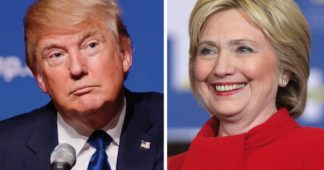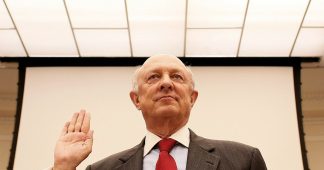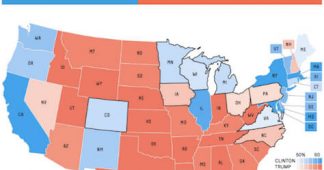There was certainly much confusion for markets, and those traders, who went home after the close and did not check the news until this morning when they woke up to president trump.
As it dawned on markets that they had been caught flatfooted for the second time in half a year, first with Brexit and then with the historic election of Donald Trump which nobody except a few fringe websites had anticipated, their reaction was identical: a slow selloff at first, followed by a furious dump, which led to a limit down halt in NASDAQ and Emini future trading. However, it was not meant to last, and after realizing that Trump’s economic plan of flooding the economy with debt, coupled with fiscal stimulus, and that his policies would likely be much more moderate than his initial framing, U.S. stock-index futures trimmed about two-third of their declines as investors reassessed Trump stunning victory.
S&P 500 futures tumbled by the maximum 5 percent loss permitted on the Chicago Mercantile Exchange before trading curbs are triggered, then pared their decline to 2.2 percent as of 6:11 a.m. in New York. The restrictions last came into force in the wake of the Brexit vote and set a floor price for the contracts through the remainder of the overnight trading session.

Longer-maturity Treasuries sold off and copper soared to a 15-month high on speculation Trump will increase spending to spur economic growth. Swaps traders cut wagers on a Federal Reserve interest-rate hike next month. Mexico’s peso led emerging-market currencies lower amid concern U.S. trade policies will become more protectionist.
“It’s an amazingly impressive recovery off the lows for risk assets,” Craig Collins, managing director of rates trading at Bank of Montreal in London. “It’s very surprising given the feel the session had to start with, that it was a massive risk-off flight to quality bid. Now the early losses are getting erased and it looks like it could go unchanged on the day by the time the U.S. gets in.”
But while Brexit has been the most often compared event in terms of comparisons, the reality is that Trump’s victory was “on a completely different level to Brexit,” as Norihiro Fujito, a Tokyo-based senior investment strategist at Mitsubishi UFJ Morgan Stanley said. “The framework of the world will change, not only in terms of economies and the financial markets, but also in terms of national security, foreign policy.”
The S&P 500 Index cut its losses by more than half, sliding 2.4 percent in early morning trading, after earlier sliding as much as 5 percent as investors rushed to price in a Trump win. Contracts on the Dow Jones Industrial Average lost 360 points, or 2 percent, to 17,900. Elsewhere, Asian shares were lower in volatile trading as gold soared, oil declined, and the Mexican peso – the proxy for Trump’s success odds – plunged to record lows against the dollar leading emerging-market currencies lower, however it has since rebounded to roughly USDMXN 20. Industrial metals gained on expected pick-up in infrastructure spending.
A knee-jerk selloff in global stocks and a rally in haven assets eased amid speculation that Trump would increase fiscal spending to spur economic growth and as the Republican struck a more conciliatory tone in his first speech as president.
“In his speech, we saw Trump strike a markedly more emollient tone than he did throughout most of his campaign, which somewhat calmed the initial reactions,” said Ken Odeluga, a market analyst at brokerage City Index in London. “There is also the expectation that with Republicans in the Senate and House of Representatives as well, the party will exert a more benign influence on the White House. Still, it’s a shock and there is no getting away from it.” Earlier, declines in futures triggered the Chicago Mercantile Exchange’s limit down price curbs when the contract fell below 2,029. The rules come into effect when S&P 500 contracts decline 5 percent from a reference price that is calculated in the last 30 seconds of trading on the previous day.
“A Trump win is expected to damage trade,” said James Butterfill, head of research and investment strategy at ETF Securities in London. He’s been in the office since 3:30 a.m. “Traders are already expressing their worries through a depreciating dollar, which is bad news for European companies. Another problem for Europe is that there’s a populist wave going on, and this adds momentum to that. It’s worrying because we have so many elections coming up over here.”
The overnight losses followed a sharp rally that began Sunday night on news the FBI had resolved its investigation of Hillary Clinton’s e-mails, and hope that Hillary’s election was all but guaranteed. Heading into the vote, most polls had the Democratic candidate ahead by several points. The S&P gained 2.6 percent on Monday and Tuesday, its third biggest gain ever in the two days before a presidential election.
As Bloomberg writes, a Trump victory, buttressed by electoral gains from Florida to North Carolina, had been portrayed by analysts as having the potential to unhinge markets that had banked on a continuation of policies that coincided with the second-longest bull market in S&P 500 history.
The stock market has shown itself more comfortable with the Democrat taking over the White House as Trump is considered less predictable after his policy positions have not been consistent during the race. At stake is leadership of the world’s largest economy at a time when America is divided over immigration, trade and the country’s role in the wider world. Traders are especially on edge after the U.K.’s vote to leave the European Union was largely not predicted by polls and betting markets.
Fiscal Stimulus
After briefly plunging below 50%, the market-implied chance of a December rate hike by the Federal Reserve climbed back up to 84 percent, suggesting that in its post-kneejerk reaction, the market still expects Yellen to hike rates in one month’s time. There is just one question: will Yellen remain Fed chairman under president Trump.
The Treasury yield curve steepened, with the rate on 30-year bonds surging 13 basis points to 2.75 percent and the two-year yield sliding four basis points to 0.82 percent. The 10-year yield climbed five basis points to 1.91 percent after falling to as low as 1.71 percent. “Fiscal stimulus seems to be the most logical explanation, with Trump and a Republican Congress expected to deliver higher deficits,” said Gennadiy Goldberg, an interest-rate strategist in New York at TD Securities (USA) LLC, one of 23 primary dealers that trade with the Fed.
As Bloomberg noted, the bond market is voting with its feet. A Republican President, House and Senate suggest gridlock might be over, so President Donald Trump may be able to make good on his acceptance speech pledges:
“We’re going to rebuild our infrastructure…we’re going to put millions of people to work as we rebuild.”
A tax-cutting and big-budget extravaganza means Treasuries will have a hard time staying higher. They’re far from panic levels, but the curve has steepened sharply. German government bond yields have fallen, underscoring their role as the European destination for risk-off trades. The flip side of this story can be seen in the relatively modest yield gains in peripheral debt.Yet even this initial, somewhat-muted panic is subsiding. Europeans are Brexit veterans, so Trump’s “Brexit plus plus plus” isn’t quite the same reason to hold fixed income as some form of haven.
* * *
Market Snapshot
- S&P 500 futures down 2.4% to 2084
- Stoxx 600 down 0.5% to 333
- FTSE 100 down less than 0.1% to 6839
- DAX down 0.6% to 10415
- German 10Yr yield down 2bps to 0.17%
- Italian 10Yr yield up 5bps to 1.77%
- Spanish 10Yr yield up 2bps to 1.27%
- S&P GSCI Index up 0.3% to 355.6
- MSCI Asia Pacific down 2.7% to 134
- US 10-yr yield up 8bps to 1.94%
- Dollar Index down 0.32% to 97.55
- WTI Crude futures down 0.4% to $44.79
- Brent Futures down 0.3% to $45.92
- Gold spot up 1.9% to $1,300
- Silver spot up 1.4% to $18.64
Top Global Headlines
- GOP’s Senate Victory Sets Stage for Trump High Court, Agenda: Obamacare repeal, tax overhauls top Republican plans for 2017
- Drugmakers Jump as Republicans’ Victory Eases Regulatory Concern: Republicans’ sweeping victory in the U.S. elections eased concerns that Democrats would require broader regulation and controls on drug prices
- Fidelity, StanChart, UBS See Risk-Off Markets as Trump Triumphs: Trio among firms that see a period of global uncertainty and a flight to safety
- Anxious World Confronts the Reality of Trump as U.S. President: China pledges to work with new leader of largest trade partner
- Walgreens Sues Ex-Partner Theranos for Agreement Violation: Contract suit filed under seal in federal court in Delaware
- Alphabet Taps Brakes on Drone Project, Nixing Starbucks Partnership: Project Wing is the latest Alphabet project to be target of financial restraint
- Icahn More Than Doubles Hertz Stake as Earnings Miss Slams Stock
- OPEC Boss Warns of Oil-Market Instability If No Deal on Output
Asia markets saw significant downside, with Nikkei closing lower by 5.4%, before European participants arrived at their desks and tempered the initial panic. MSCI Asia Pacific Index declines, Japan’s Topix falls the most since Brexit, yen strengthens. All 10 sectors fall with industrials, energy underperforming and telcos, financials outperforming
Top Asian News
- China’s Factory Prices Quicken as Drag on Global Inflation Eases: Oct. PPI +1.2% y/y vs est. +0.9%
- China Bank Regulator Said to Warn of Risks in Lending to LGFVs: CBRC’s Shang says some local governments evade borrowing curbs
- Hong Kong Flats Sell for Record Price, Defying Latest Home Curbs: Adjoining flats in Mount Nicholson sold for HK$912m
- Tencent Said to Budget $295 Million for Backing Movie Projects: Investments said to be used for films in China and Hollywood
- Thailand Holds Interest Rate Amid Market Turmoil, Growth Risks: 23 of 24 economists forecast rate to be kept unchanged at 1.5%
In Europe, the Stoxx Europe 600 Index fell 0.8 percent after sliding as much as 2.4 percent. The DAX trades -1.3%, financials and exporter names are the worst performers in Europe in the wake of Trump’s surprise victory, with outperformance seen in mining (Fresnillo +8.4%) and healthcare names (Shire +7.3%). This comes in the wake of criticism by Clinton of pharmaceuticals, while miners outperform given that significant upside seen in gold Gold and Silver. The initial significant shock in equity markets have pared significantly in the wake of Trump’s speech, where he struck a conciliatory and presidential tone. Fixed income markets have been equally volatile, with Bunds gabbing higher and trading above 163, before paring much of the initial gains to trade around the 162.00 level, while T-Notes now trade at yesterday’s levels. Of note, some analysts have highlighted expectations of a more hawkish Fed board during Trump’s term could be positively impacting. Losses were tempered by a rally in health-care stocks, which have
suffered amid speculation Clinton would push for drug-price controls as
president. Novo Nordisk A/S, Roche Holding AG and Shire Plc jumped at
least 6.5 percent. 16 out of 19 Stoxx 600 sectors fall with basic resources, banks underperforming and tech, financial services outperforming. 75% of Stoxx 600 members decline, 24% gain
Top European News
- World’s Biggest Wind Turbine Maker Sinks After Trump Victory: Vestas Wind Systems gets about 40% of sales from Americas
- Tesco Bank Pays $3.1 Million to Replace Cash Taken From Accounts: About 9,000 clients fell victim to fraud on weekend, firm says
- Alstom Spurns Shareholders Who Rejected Kron Pay Package: Board says 6.6 million-euro payout to Patrick Kron was legal
The MSCI Emerging Markets Index dropped 2 percent, the most in almost two months, amid concern over Trump’s protectionist policies. Hong Kong, South Korea and Taiwan suffered the biggest losses. Russia bucked the trend on speculation Trump will improve ties with Moscow, leading to an end to sanctions that have stalled an economic recovery. The Micex Index climbed 1.4 percent.
In FX, Mexico’s peso tumbled to a record 20.7818 per dollar and was the worst performer among currencies worldwide. Other higher-yielding currencies fell, with South Africa’s rand weakening 3.1 percent and Brazil’s real down 1.9 percent. South Korea’s won and Turkey’s lira both fell 1.3 percent. Currencies viewed as havens strengthened, with the yen climbing 2 percent. While the euro gained as much as 2.5 percent, it gave up much of that advance to trade 0.7 percent stronger.
In commodities, Copper led gains in industrial metals, rising as much as 4 percent to $5,443 a metric ton, its highest since July 2015. Nickel advanced nickel climbed 2.4 percent and lead advanced 1.1 percent. Gold pared its biggest surge since the U.K.’s Brexit vote in June as a rush to haven assets abated. Bullion for immediate delivery was 2.2 percent higher at $1,303.80 an ounce, compared with a gain of as much as 4.8 percent earlier in the day. West Texas Intermediate crude was 0.2 percent lower at $44.89 a barrel, after losing as much as 4.3 percent. Brent was down 0.2 percent at $45.97.
US Event Calendar
- 7am: MBA Mortgage Applications, Nov. 4 (prior -1.2%)
- 10am: Wholesale Inventories m/m, Sept. F, est. 0.2% (prior 0.2%)
- 10:30am: DOE Energy Inventories
- 12pm: Monthly World Agriculture Supply and Demand Estimates
- 1:30pm: Fed’s Kashkari speaks in Eau Claire, Wisc.
- 3pm: Reserve Bank of New Zealand cash rate, est. 1.75% (prior 2%)
- 9pm: Fed’s Williams speaks in San Francisco
DB’s Jim Reid concludes the overnight wrap
A Trump win is likely to be viewed negatively across a wide range of assets in the short-term (it already has as you’ll see below) but the range of medium-term outcomes are much wider. It increases the chance of higher fiscal spending but it will also reinforce the backlash against globalisation and associated forces of which migration policy and trade are obviously likely to be heavily scrutinised. So as the trend is already pointing to, expect lower risk assets at first, lower bond yields on a flight to quality but then higher yields once his spending plans are digested and an equity market that might at some point benefit from reflationary policies but with greater risks (lower trade and global openness) and higher volatility. First Brexit, now Trump and the 2016 anti-establishment triumvirate could be formed in less than 4 weeks by a ‘No’ in the Italian constitutional reform referendum. The political world is changing and the consequences are likely huge over the years ahead. As we discussed as the main theme in our long-term study in September (An Ever Changing World), the 35-year super cycle in assets, politics, policy and globalisation has likely turned.
Demographics are slowly reversing the super cycle but more importantly in the short-term it felt to us that politicians would either have to address the mass disaffection to current policies and trends of this 35 year super cycle or face a wave of anti-establishment support and eventually being thrown out. Well Trump, assuming he wins, is a perfect example of this.
It’s very easy to say this is a big negative for the global economy but current policies around the world are perpetuating the soporific post GFC recovery. A shake up is badly needed but whether Trump is the right version of the shake up is open to debate. If Trump wins then that could increase the odds of both a better medium-term economic outlook and also a worse economic outlook. It also has geo-political ramifications that are hard to contemplate at this stage. EM looks vulnerable as US self interest could dominate. Trade deals could be ripped up. Ironically Trump has hinted that a trade deal with the UK could be a priority!! As an aside as someone that loves skiing, I do worry about climate change as a result of this result as Trump has threatened to pull the US out of the Paris climate change agreement. More time for cycling up mountains maybe rather than skiing down them.
It was almost impossible to keep up with the early moves in markets overnight as the initial state counts got announced with the nail biting Florida race in particular causing FX markets to swing wildly. Right now though, risk aversion dominates. S&P 500 futures are limit down -5.00%, bourses in Asia are down anywhere from -2.00% to -4.00%. The Mexican Peso has tumbled -13.20% while the South African Rand has collapsed -4.24%. Meanwhile the Japanese Yen has surged +3.83% and the Swiss Franc +2.30%. Credit markets in Asia-Pacific are 5-7bps wider. Gold has jumped +4.40% and Oil is down -3.87%. It’s hugely volatile though, so it’ll be worth a refresh when this hits your email.
As a complete sideshow to the Election overnight, the October inflation data was also released in China this morning. CPI was reported as increasing to +2.1% yoy as expected, up from +1.9% in September, while PPI has risen to +1.2% yoy from +0.1%, a little bit more than the consensus had forecast. Its worth noting that that PPI print is the highest since December 2011 – the second positive YoY reading after 56 months in negative territory.
Well Tuesday feels like a long time ago and given that it is now largely irrelevant and consigned to history, we’ll keep yesterday’s recap very brief, ignoring the market moves and focusing on some of the highlights. The more interesting news yesterday away from all things US Election related was the announcement from the UK Supreme Court that the appeal hearing has been officially confirmed for the four days starting December 5thalthough the exact number of hearing days depends on further submissions received from parties. A reminder also that the Italy constitutional referendum date is December 4th, the ECB meeting is on December 8th and the Fed meets on December 14th. Back on Brexit, the UK Telegraph is suggesting that a group of pro-Brexit Conservative MP’s are pressing for a debate next week leading to a vote to start talks on leaving the EU. It promises to be a busy end to the year.
Yesterday we also heard from the hawkish Chicago Fed President Charles Evans. Evans, who has a vote in the FOMC in 2017, said that ‘my outlook is strong enough and I’m optimistic about inflation increasing that I think that perhaps as many as three rate increase from where we are today could be appropriate’. Evans did however cite some concerns with inflation expectations, saying that expectations ‘have been moving down in a way that’s not consistent with 2%’. He said that ‘the way to change that was to assure the public the Fed would meet its goal and that in order to do that, we’re not going to pull back too quickly’. Those comments are in contrast to the much more dovish set of comments from the ECB’s Coeure yesterday. He said that the ECB’s ‘highly accommodative monetary policy remains appropriate and will continue to be appropriate until inflation is firmly back on track and heading towards 2%’.
With regards to the data yesterday, in the US we learned that JOLTS job openings in September rose to 5.49m from 5.45m in August and more or less matched expectations as per Bloomberg. The job openings rate nudged up one-tenth to 3.7% while the hiring rate slid by the same amount to 3.5%. Meanwhile, the NFIB small business optimism reading rose from 94.1 to 94.9 this month, the highest reading since December last year. Data in Europe was characterized by softer than expected industrial reports for Germany and the UK. With regards to the former, IP declined -1.8% mom in September (vs. -0.5% expected) which had the effect of lowering the YoY rate to +1.2% from +2.4%. In the UK IP weakened -0.4% mom in September (vs. 0.0% expected), although manufacturing production was up a slightly better than expected +0.6% mom (vs. +0.4% expected).
As we look at the day ahead, clearly the focus will be on the all things to do with the outcome of the US election in markets and which will almost certainly override anything else today. There is a small amount of data to highlight too. In France we’ll get the Bank of France business sentiment reading for October and the September trade data in the UK. The European Commission will also release their latest economic forecasts. Over in the US this afternoon the September wholesale inventories and trade sales data is due. Away from that the Fed’s Kashkari is due to speak this evening, while the BoE’s Haldane is scheduled to speak this afternoon. The ECB’s Coeure also speaks this afternoon.













